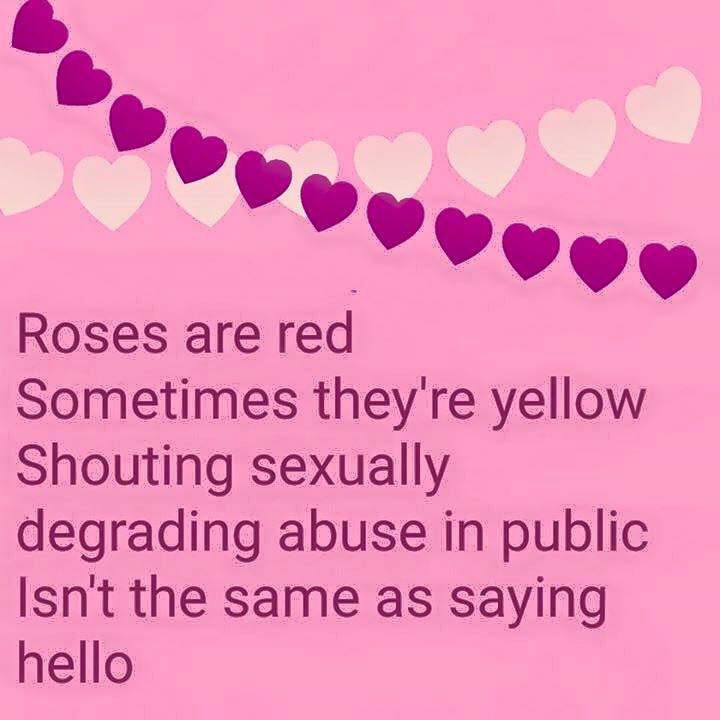
Valentine’s Day advice for how not to be a street harasser!

With people like James Norton making a living from teaching men how to approach women, I think it’s very important to supplement that with advice on how to approach women without being a harasser!
Here’s an excerpt from a Guardian article I penned to do just that:
While perhaps obvious, the most important factor is treating the person with respect. Do not use insults or sexually objectifying language. A hello, smile or gender-neutral small talk that does not include comments about their appearance (at least, not right away) are rarely going to offend anyone and can open up the door to further conversation. Avoid familiar terms like “baby”, “honey” or “love”. While some people may not find that offensive, many do.
Make sure there is consent in your interaction. Does their body language, including eye contact (not lack thereof), and tone of voice indicate they want to interact with you, too? If you are unsure, you can always ask, is it OK if I talk to you?
Consider if the context might make them feel uncomfortable if you approach them. For example, is it dark out or a deserted area? Are you larger or older than them? Are you with friends while they are alone? If any of these factors apply, be aware that they may feel a little unsafe or unsure if you approach. So make it clear that you mean no harm and then leave them alone if they look uncomfortable.
Do not curse, insult or hurt a person who turns you down. Most of the time, people in public do not want to meet or even talk to someone. They want to get from point A to B or enjoy fresh air. They may be in a hurry or be preoccupied. Therefore, chances are that a person you approach is not going to want to talk to you or interact with you. That has nothing to do with you personally.
Talking with young men about appropriate stranger interactions in public is especially important. Society often suggests that in heterosexual relationships, it is men who should approach women. Men’s peers, family members and the media may tell them that it is OK, and even flattering, to be aggressive or to sexually objectify women whom they encounter (no matter the men’s or women’s sexual orientation). I doubt most men want to be harassers, but if they take these messages to heart, they may become harassers.
What advice would you give? Have you met someone on the street, at a bus stop, on public transportation, or the park? What did they do or say that made it nice instead of harassment?
Let Egypt inspire you! Take action online
In a few short weeks, the efforts of the people of Egypt, done largely through online organizing, led to unprecedented political change. Egypt is just the latest (and one of the most impressive) examples of how the Internet gives ordinary people a place to have a voice, share ideas, and create change.
Here are three opportunities for people in the U.S. to participate in small online actions that can, and surely will, lead to larger change.
If you are anyone, anywhere:
The National Museum of Crime and Punishment thinks that intimate partner violence should be described as “crimes of passion” during their Valentine’s Day events this weekend. No – such violence is motivated by issues of power/control, not passion. Support Hollaback DC and sign the petition demanding that the National Crime and Punishment Museum take intimate partner violence seriously.
Washington, DC- area residents or visitors who’ve experienced or witnessed street harassment:
Please help HollaBack DC! better understand public sexual harassment and assault in the DC Metro area by taking their 10-15 minute survey! Your answers will help them identify community needs and directly affect the workshops, programs, and materials that they offer. The data from this survey will also go into a report about the status of the issue in the DC metro area.
Queer women of color in New York City:
Kimberlynn Acevedo is writing about queer women of color* and their experiences in public spaces of New York City, including but not limited to the subway system and the streets, as well as semi-public spaces like restaurants and other businesses. Her goal is to give a voice to women who are, more often than not, underrepresented in the growing discussion around gender-based harassment, violence, and discrimination. If you are a queer woman of color in NYC, please take her survey and share your voices and views.
*queer is open ended and women is also open to self-identification
Thank you! Your five minutes of action is time well spent.
V Day
Today is V-Day and people around the U.S. and world are taking action to end men’s violence against women. Access anti-violence resources, find an event in your community, and/or donate to help support the movement.
Today I volunteered with the Rape, Abuse & Incest National Network. I do so a few times each month as an Online Hotline volunteer, and today I did so as my V-Day activism. Are you participating in a V-Day event or related activism? If so, what?
To end, here’s a turning-the-tables on street harassment story from my informal survey:
“A SUV full of high school boys were yelling at me and whistling while I was walking my dog. They continued down the street and got stuck at a stop sign behind a bus. I had time to walk down to where they were, get right up to their window and made them wish they weren’t there. When the tables were turned, they had no power.”
Hopefully they’ll think twice before harassing someone in the future!
